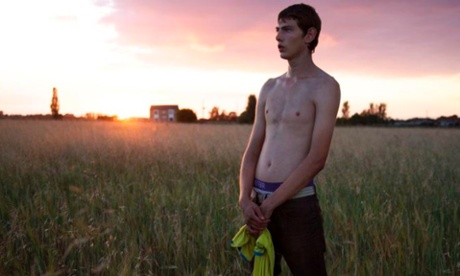
Writer-director Guy Myhill makes a strong feature debut with this intelligent essay in Brit poetic social realism, set in the beautiful yet desolate fenland bayou of East Anglia. It is a vast landscape in which his characters feel free and trapped at the same time. Myhill has turned in an accomplished piece of work, well acted and beautifully photographed by cinematographer Simon Tindall - although for me it skates a little close sometimes to cliché and mannerism. (There is a PhD thesis to be written on the incessant use of motor-scooters in European social-realist movies as a signifer for underclass aimlessness. It is almost compulsory to have a long wordless scene showing someone zooming along, with nothing audible but the engine’s buzz-whine. Well, Myhill brings off that traditional scene with as much as skill as everything else.)
Newcomer Liam Walpole plays Goob, whose last day at school is marked by a ceremonial tearing-off of his school uniform on the bus: the driver grimly gives this school leaver some career advice: “get out of this shithole”. But no-one here has any intention of doing anything of the kind – and poor semi-naked Goob has no clothes, no identity, to prepare him for adult life. He has an almost luminously innocent face, like a cherub or a cat, and yet he is plunged instantly into a guilty world of cynicism and simmering tension.

His mum (Sienna Guillory) runs a burger bar and has now taken up with a psychopathically obnoxious bully and abuser called Gene Womack – bad-guy typecasting for Sean Harris. Womack is a beet-farmer and fancies himself a big noise thereabouts, able to offer summer work to transient workers. Creepy perv that he is, Womack has his hooded eye on the pretty young women among them and is cheating on Goob’s mum all the time.
There is a horribly funny moment when Womack’s assistant accidentally catches him masturbating in his van, watching the sweating women working in his fields. Womack also has ambitions to be a stock-car champ and wins races through cheating and illegally modifying his car – which inflates his charmless ego further. Womack hates Goob but has to tolerate him for his girlfriend’s sake. As the long hot summer drifts on, tensions rise to boiling point.
Outsiders come in and befriend Goob: a smart gay guy called Elliot (Oliver Kennedy) – who enrages the boorish and envious Womack with his exuberant charm – and a summer worker called Eva (Marama Corlett) who falls for Goob a little. They appear to show Goob new ideas, new ways of thinking about himself. But he cannot respond, perhaps content with and even excited by the floating freedom and lack of responsibility that he seems to enjoy, despite the nasty and ever-present Womack.
You may wonder where the film is leading us – except to the inevitable flourish of violence - but perhaps directionlessness is the point. Actually no one here is capable of imagining a different future for themselves, or indeed, seriously questioning the present.
There are moments of unoriginality and deja-vu in some of the visual language here, but The Goob is an arresting and confident debut.
• This article was amended on 29 August 2014 to correct the name of Simon Tindall, the cinematographer of The Goob, from Simon Tisdall as an earlier version said.







